|

"There is always inequity in life.
Some men are killed in a war and some men are
wounded, and some men never leave the
country...
Life is unfair."
John F. Kennedy in a press conference on March
21, 1962
What follows is now history. At that time, long
ago and far away, it was very much the present,
and for many it can never be history, for they can
neither forget it nor confine it to their past.
Pictures that speak for themselves can perhaps
provide the most honest and straightforward view
of what war can be. The text below is excerpted
and paraphrased from a letter to President Nixon
sent during the summer of 1970 and published in
LOOK Magazine on July 28, 1970.
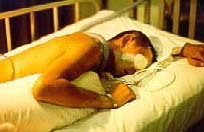
"They have been in a war for years and years
and they are quite debilitated and decimated,
and I don't think they are capable with any
kind of resistance of continuing this fight."
Spiro T. Agnew, Vice-President of the United
States
Face the Nation (CBS-TV)
May 3, 1970
I had been practicing neurosurgery before my
commissioning, and naturally enough assumed I'd
soon be in Vietnam. The army does move in strange
ways at times, and I found myself outside Tokyo
for somewhat less than two years. C-141 transport
planes would pick up our patients at various
staging facilities in South Vietnam, wherever
large enough airfields were secure, and would fly
them to the next hospital in the evacuation chain.
This meant the Philippines, Japan, occasionally
Okinawa or the United States. We were privileged
at the 249th General Hospital in Japan to see the
majority of seriously injured patients with wounds
of the central nervous system, and thus had a fair
overview of how things were in military
neurosurgery during this time.
I'm certain that many of our patients would not
have survived long after initial wounding in
previous wars. It was not unusual for us to
receive gravely brain-injured men who had had
their initial brain surgery within one to two
hours of wounding. Needless to say, because of the
tactical situation, it was sometimes impossible
for a helicopter to reach a man for twenty-four
hours or more, but these isolated delays were more
the exception than the rule.
The 249th General Hospital, where I worked, was
located in Asaka, just northwest of Tokyo. It was
a one-thousand-bed general hospital. We received
about one thousand wounded each month and either
evacuated or returned to duty slightly less than
that number. The hospital gates were manned by
local Japanese security guards, and the hospital
complex was protected by a high wire fence.
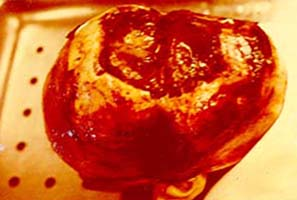
"I would never send troops there."
Dwight D. Eisenhower
General, United States Army
New York City
June 8, 1952
Each ward in the hospital had its own medical
flavor, and one could tell at a glance which
subspecialty was represented. We had a full
service hospital of course and did just about
anything you could think of, except for organ
transplants.
The two neurosurgical wards had between sixty and
eighty beds. and the evacuation system kept our
census fairly high. We had two fully trained
neurosurgeons, myself and a surgeon from southwest
of Worcester, Mass. All our patients had something
wrong with one part or another of their nervous
system--usually something was missing after
injury. Although we usually kept patients between
five days and several weeks, the turnover could be
quite brisk. During times of stress--for instance,
during Tet when the enemy was acquiring its
psychological victory--we continued our patients'
evacuations to the United States as briskly as
possible. I would usually write out the patient's
discharge and transfer summary at the same time
that I did his admission history and physical.
May I suggest that if another 'Tet-like' period
occurs in this non-war, it would save a lot of
time and effort if patients were sent directly
back to the United States from Southeast Asia
rather than to Japan. Undeniably, Japan is a
wonderful land, and its culture is fascinating,
but so few of our patients really enjoyed the time
they spent there. Mostly, they wanted to know why
they had come to Japan, and what were they doing
in that part of the world. I never really did find
the answer to that question in my one year, eleven
months and twenty-eight days of active duty, and
must further confess that I never heard a very
reasonable explanation of what any American was
doing over there.
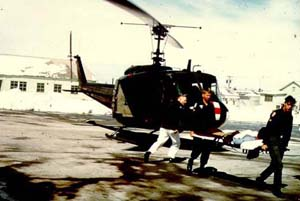
"Vietnam has been good for the Marines, and
the Marines have been good for Vietnam."
Herman Nickerson, Jr.
Lieutenant General, U.S. Marine Corps
Danang, South Vietnam
March 9, 1970
I wonder if you ever got that report from the
costs analyst who visited with us in Japan. He
came from the Department of Defense. I tabulated a
list of patients on our ward about that time, and
tried to determine from a medical point of view
what percentage actually benefited in their
treatment by coming to Japan instead of taking an
extra five or six hours to go directly home. We
had somewhat more than sixty patients on the two
wards then, and I could honestly say that two or
perhaps three of them might have benefited by not
taking the more direct route. I'm not quite
certain of the final figure the Pentagon was
given, but I was told that the costs analyst
received from our medical command in Japan the
statement that fifty to fifty-five percent of our
men benefited from their time with us. It is
interesting to see how the assessment of the
situation varies depending from what level in the
chain of command you are watching.
Many of our patients with severe degrees of brain
injury showed very little resentment against the
circumstances that found them in Vietnam . In one
sense, the more severely brain-injured were
fortunate in that they were less aware of their
deficits and certainly experienced less anguish. I
doubt the same would hold true of their families.
I was never entirely satisfied with treating one
particularly severe type of problem. Briefly, the
difficulty arises because such a large amount of
nose, middle face, and base of skull are
destroyed, along with brain substance. Infection
and continued leaking of spinal fluid were most
difficult to manage. I do not think we have found
an ideal way yet of treating this type of injury.
The loss of tissue in land-mine injuries was
rather common. Such wounds were extensively
debrided in Vietnam, and after five to seven days
of care, they were either further debrided of dead
and necrotic tissue or sutured. Many of our men
had multiple-fragment wounds from rockets, land
mines, booby traps or mortars. When the brain or
spinal cord was also damaged, they'd be assigned
to our neurosurgical service and we'd have an
opportunity to extend and broaden our general
surgical experience with caring for these
associated injuries.
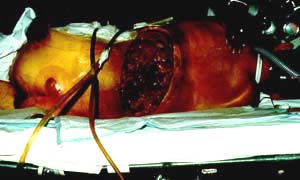
"So I really personally believe the
introduction of U.S. ground troops in South
Vietnam today would hinder rather than help
the campaign against the insurgency."
Robert S. McNamara,
Secretary of Defense
Washington, D.C.
February 17, 1964
Injuries such as the ones I photographed in my
operating room are really what prompted me to
write you the letter. The burden of what's on my
mind these days is really about patients such as
these. I admit I'm not terribly interested in
dominoes, or in Laos, or in who's threatening whom
in Cambodia or Thailand. My background is not in
power politics or in Southeast Asian culture; it's
in caring for patients and in trying to make sick
people well. I must admit I've had a terribly
difficult time trying to understand why these
young kids were being mashed in Vietnam when I
thought they should be back home growing a little,
or with their wives and children, or with parents
and friends.
Many of our patients' wounds covered a fairly wide
spectrum. Some men died in hospitals in Vietnam,
some died in the Philippines or in Japan, and some
died back in the States. Some survived to reach
veterans' hospitals, and some returned to civilian
life. There are some brain-injured men who will
one day resume the support of their families and
eventually return to ways of living pretty much
the same as before they went off to non-war. These
are the luckier ones who'll bear only a few scars.
Their less lucky comrades will have a paralyzed
limb, or two or three or four. Some will be quite
bright and alert again, but some will not be able
to speak, reason, protest or assent. It's for
these, a sort of silent majority, that I'm writing
you.
If you had visited our ward, you might have seen
young soldiers on their sides and facing down so
that they would not aspirate or breathe into their
lungs any excess secretions or vomit that would
make their situation more precarious. Tubes
carried moist air through small holes in their
windpipes, and this made it easier for the staff
to aspirate secretions and prevent pneumonia. With
a large number of unconscious patients, these
measures greatly reduced the incidence of
pulmonary complications. As you can appreciate,
these patients were unable to cough if they were
deeply comatose, and of course they were not aware
of the need to empty their bladders or evacuate
their bowels.
The Vice President's recent remarks that if we had
shown a little more backbone in the Republic of
Vietnam we would have won the war sooner reminded
me of one young man I had treated. He had a
complete loss of spinal cord substance in his
midback with resultant inability to feel or move
his legs. A small amount of bone protruded through
his surgical incision and this was obviously
infected, as was the surrounding tissue. We
discovered that the whole vertebral body, a fairly
vital part of this boy's backbone, was infected.
When I grasped the bone itself and pulled gently,
the entire segment released from its surroundings.
This is a fairly common maneuver in the autopsy
room on a cadaver, but I had never done this or
heard of its being done to a living person.
The Red Cross and other woman workers were awfully
helpful to our troops as they returned from the
combat zones. They would write home and let the
Stateside family know how the young soldier, soon
to be veteran, was getting along. Their aid was
invaluable with the sightless, paralyzed,
amputated, and mentally subdued, of course. In our
ward, these women often helped with patients
confined to CircOlectric beds. These beds were so
useful that I often thought the Veterans
Administration should see to it that each
quadriplegic patient who reached home received one
along with his discharge papers. These powered
beds were most useful at our hospital in Japan, as
the staff could adjust a patient's position not
only for comfort but also for nursing wounds other
than crippling spinal injuries. As you may
realize, one of the biggest problems in these
cases is that not only do the patients have no
movement of their limbs, but they also have no
sensation of their paralyzed parts, and these
areas may break down, become necrotic and thus
rather difficult to manage.
The wounds could be quite devastating to the
brain. I was impressed by the amount of brain one
could lose and still live, in a way. As I'm sure
you know, in most people, the brain is a fairly
important organ, and when mortar fragments, or
dirt, or splinters of bone scatter through the
head, it's pretty hard not to cause some fairly
extensive injury. One boy with a very damaged head
was so ill when he reached Japan that it was
apparent he was not going to survive to make the
trip home. His parents came over to spend his last
days with him. I might just mention the local
problem with the wound. You see, he had lost a
great deal of skull and brain covering along with
his scalp, and the wound and underlying brain were
infected and under very increased tension.
Well, in any event, Christmas Eve arrived, and the
children from one of the local schools were
serenading the wards of the hospital while this
boy's parents maintained their vigil. As the
youngsters came onto the ward, you could have
hoped for a little bit of a miracle, but instead,
the patient passed on at that moment. We all
celebrated Christmas in different ways that year.
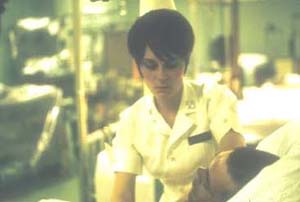
"I have never been more encouraged in my
four years in Vietnam."
General William C. Westmoreland
Commander, United States Forces in South
Vietnam
Washington D.C.
November 15, 1967
I must sadly confess that from my vantage point,
we weren't winning very much. Clearly, it was a
long time ago that we were told we'd soon be done
with it. We were assured and reasssured that
victory was almost in sight. Now, I wouldn't
presume to contradict men who were my military
superiors, and I wouldn't for a moment question
the statements of either the elected
representatives of the South Vietnamese people, or
of our own field commanders and generals in the
Republic of Vietnam, but I would in all humility
submit that these boys and men who came under my
care were not cheered by the thought that we were
winning. These boys felt that they had lost; and,
of course, in a simplistic sense, I guess that
they had lost -- an arm, a few legs, some brain, a
little bone, a kidney, a lung or spleen, perhaps
some liver. I must sadly observe that despite our
cheery casualty statistics that we've killed
fifteen times as many North Vietnamese and
Vietcong as they've killed of us, the fact remains
that many of my patients felt that they had lost.
I guess it's difficult to avoid giving you the
impression that I'm sort of an anti-war kind of
person. I admit that I didn't feel too strongly
one way or the other before putting on my uniform.
It really took very little time to realize that
there were better ways of dying for one's country
than the ways we devised for our younger brothers
and neighbors. Not all my patients were draftees
or short-termers who were anxious to serve their
hitch and get out; we often had patients on the
ward who were career soldiers, and at times we
even had some officers.
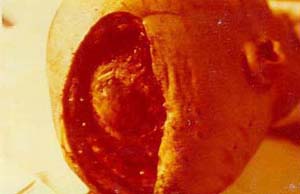
"He was a farm boy who had worked in the
fields, and his family just didn't believe
sunstroke killed him.
"I checked into it, and the Pentagon reported
his face and body were reddened by the sun
while he waited three hours to be evacuated by
helicopter from combat.
"Finally they acknowledged he was waiting to
be evacuated because he had three bullet holes
in him. And they call that an incidental
death; Well, they changed it.
"The number of combat killed and wounded have
become so great ... they are trying to hide
it...a clumsy effort to deceive the public
about casualties in this most unpopular and
undeclared war."
Stephen M. Young
Senator from Ohio
Washington. D.C.
April 29, 1969
My own ward was fairly characteristic. Comatose
patients certainly can be seen wherever much
neurosurgery is being done, but we had a rather
large volume of them. The Army cared for its
paraplegic and quadriplegic patients with Stryker
frames and CircOlectric beds that provided
movements and changes of position the men could
not provide themselves. In our ward, we had quite
a bit of difficulty trying to decide who should
continue evacuation back to the States and who
should return to combat. I'm glad to hear that the
burden of making this decision has been eased, and
that all patients who reach Japan are now able to
continue home. I must confess this seems quite
reasonable; the other way seemed somewhat cruel --
almost like sending men back to combat because
they hadn't been hurt badly enough the first time.
I'd like just once more to reemphasize that I do
not intend this letter as criticism or expression
of disapproval. Why, you weren't even my
Commander-In-Chief during most of this time, and
the President who preceded you was being reassured
that the end was just around the corner, that the
enemy was on his last legs, that we had just to
buckle down a little longer and the coonskin would
be on our wall, etc.
I was happy to read not long ago that the Army
Chief of Staff has stated that the Vietnam War has
technologically been a great success. I assumed he
must have had in mind such developments as a MUST
unit. This is a Medical Unit Self-contained
Transportable and will certainly be useful in
situations where a small hospital must be rapidly
set up near a large disaster area. If I understand
the concept correctly, the idea is to send the
hospital to any area where large numbers of
casualties are being generated. I must apologize
at this point for a temporary diversion.
I had never before thought of sick or wounded
people as being generated. It's a concept I
learned during my indoctrination period at Fort
Sam Houston in Texas. You will agree, surely, that
it is a modern way of thinking about these
problems. It's clearly much nicer to sit in a
conference and hear about five hundred or five
thousand casualties being generated in a given
situation. It's a much nicer way to think of large
groups of people in this manner, somewhat like
electricity being generated at some power plant or
other. Well, in any event, I just never could get
it into my own head, or discipline myself to think
of my patients in this fashion -- being generated
here, stored there, transported, re-stored, etc.
This probably accounts for my hesitancy in being
more outspoken with that costs analyst from the
Pentagon. I just couldn't convince him that we
were dealing with patients, not packages.
I must confess that despite the nice commendation
the country has given me, and despite your
enthusiastic support during this conflict, I
didn't ever come to feel that being part of the
Army team was really my cup of tea. I just never
managed to get into the spirit of it.
This letter has far exceeded my original intention
of just jotting down a quick note; but if it's
provided you with any information or a viewpoint
somewhat different from what has reached you
through more standard and orthodox channels, then
it has certainly been worth my time. I do hope I
have not bored you, either, with my thoughts or
these photographs.
When I left active duty and was being discharged
through Oakland, I was gratified to see a
welcoming sign in the corridor. I regretted only
that my own patients who had been evacuated
through medical channels were unable to see this
concrete expression of their nation's gratitude.
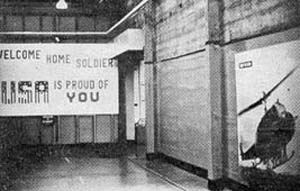
"It simply does not matter very much for
the United States, in cold, unadorned
strategic terms, who rules the states of
Indochina. Nor does it matter all that
terribly much to the inhabitants. At the risk
of being accused of every sin from racism to
communism, I stress the irrelevance of
ideology to poor and backward populations."
J. William Fulbright
Chairman of the Senate Foreign Relations
Committee
Washington. D.C.
I appreciated the opportunity of visiting Japan
and of broadening my medical experience during
that time. I regret that we lost so many men, not
only in Vietnam, but also in our overseas
hospitals. Some of the casualties were more
difficult to retrieve or repair than others.
Caring for the wounded is indeed a privilege; but
I was never able to convince myself that they had
been wounded for any good end. They were, after
wounding, and I'm certain before wounding also,
the finest men I've seen. But I cannot help but
point out my feeling that this war was unworthy of
them. They gave too much in that far-off place --
and we should not have sent them there.
I know that you deplore this conflict as much as
I, perhaps for different reasons. I did hope that
sharing these few pictures and thoughts with you
would in some way explain why I felt compelled to
submit my resignation as I did, rather than to
extend my time in the Army. There are, happily
enough, younger men now available to carry on the
neurosurgical tradition in and after combat. I do
hope that they are made of stronger stuff inside
than I, and that their tours of duty will not
remain in their minds quite so indelibly as has
mine.
Knowing how the military operates, I'm certain
that neither you nor your predecessors have had
the opportunity to see these scenes. We who were
fortunate enough to be brought into active service
as two-year doctors have, of course. When we
reported for duty, the threats that our orders
would be changed for Vietnam if we didn't extend
for a third year seemed somewhat hollow. None of
our group being indoctrinated at San Antonio was
cowed. Things evidently later changed, for we had
several men appear in Japan this past year after
having extended their tours of duty for that very
reason. I must admit that I was never terribly
impressed by the personnel procedures or
procurement policies of the Army. But if the
courts allow this practice to continue, then I
suspect the military may have found a way to get
one-and-one-half times as much wear out of this
former group of two-year doctors. I congratulate
your planners.
I really had hoped to send you this note while I
was still on active duty, but we were somewhat
busy most of the time, and my colleagues and
superiors cautioned me that it might be more
appropriate to allow a seemly interval to pass
before trying to record my recollections for you.
I'm afraid I'm leaving out a great deal that
seemed important to me at the time, but I'm
nevertheless able to recall a few glimpses of what
was occurring. I had been told that if I waited
long enough, perhaps the war would go away. I did
wait, but it didn't seem to go away at all...
It's hard to believe in war if you take the
preceding or following seriously.
Here are six Pictures without Words that appeared
in the LOOK article:
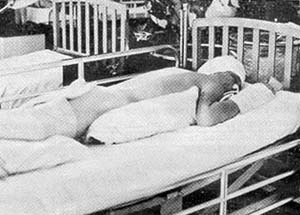
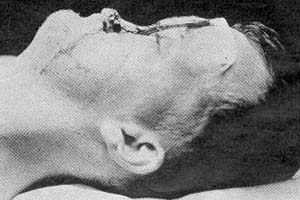
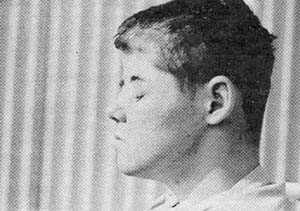
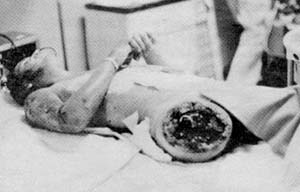
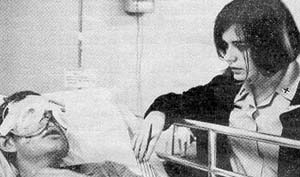
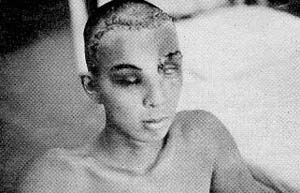
I know the aphorism that "a
picture is worth a thousand words," but I've never
felt that any picture or series of pictures could
equal the power of Dalton Trumbo's novel: Johnny
Got His Gun.
|













